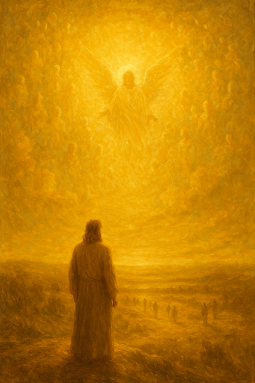In every culture and philosophy, there seems to be a common agreement, that is to say that virtues are to be pursued and vices avoided. The former, like courage, compassion, temperance, and wisdom, are celebrated as ideals that elevate the human soul and spirit. On the other hand, the latter, such as greed, envy, wrath, and sloth, are seen as moral failings that corrupt our character, our spiritual parts and our relationships with others. This double classification often gives us a clear direction in life—to strive for the good and renounce the bad. However, what about our passions? Where do they fit in this moral framework?
Passions are intense emotions or drives that move us deeply. They can be joyful or sorrowful, uplifting or destructive. Unlike virtues and vices, which are more moral categories, passions are psychological and emotional forces that may affect our actions. The question then arises as to whether negative passions, like anger, fear, sorrow etc, are inherently dangerous and whether we should aim to weed them out, simply control them, or find a balance, a middle way.
Consider anger, for example. Left unchecked, it may lead to violence, hatred, and division. But when tempered and guided by reason, anger may serve a moral purpose. A parent who feels righteous anger may discipline their child not out of malice but out of love and a desire to teach right from wrong. Similarly, societal outrage against injustice has often been the spark for reform and progress. Thus, even a passion as volatile as anger, when balanced and rightly directed, may be a force for good.
This idea reflects the ancient philosophical concept of the "golden mean" (aurea mediocritas), particularly emphasised in Aristotle’s ethics. According to the Greek philosopher, virtue lies in the balance between extremes. Courage, for instance, is the balance between cowardice and recklessness. Likewise, managing passions involves neither suppressing them completely nor indulging in them recklessly, but finding the right measure in each context. Passions may not be enemies of virtue, but allies if understood and harnessed wisely.
However, not all philosophers agreed. The Stoics, for example, tended to believe in a more radical approach to the passions. For most of them, passions (pathê) were irrational and harmful, stemming from false judgments and mistaken values. They advocated for apathéia (from the Ancient Greek a-, "without," and pathos, "passion"), a state not of apathy in the modern sense, but of equanimity and freedom from disturbance. The sage, in Stoic philosophy, is one who has eradicated irrational emotions and lives according to reason alone. In this view, passions are not to be balanced but overcome entirely.
According to Chrysippus, a thinker pf the Early Stoa, the passions are evaluative errors, wrong opinions about what is good or bad. For instance, fear is an irrational aversion to something anticipated as harmful, while lust is an irrational desire for something mistakenly seen as good. These passions disrupt the harmony of the soul and cloud judgment. The Stoic concept, therefore, is not to feel less, but to feel rightly: not to be cold or unfeeling, but to experience eupatheia (from the Ancient Greek eu-, "good/well"), the rational, measured emotions such as joy (chara), wish (boulesis), and caution (eulabeia). These are lucid emotional states appropriate to the wise person who sees the world rightly.
Moreover, Seneca, a Roman Stoic, strongly argued that dangerous passions, like anger and hatred, should not simply be moderated, but extinguished. To those who claimed that courage required anger, he responded that reason alone is sufficient to motivate moral action, and that once reason is touched by passion, it loses its clarity. Philosophy, in this view, is medicine for our soul, teaching us to distinguish good from evil and to preserve inner peace.
Yet even within ancient thought, there were alternative views. Plutarch, though admiring Stoicism, believed that all passions could carry something useful. Like music, he argued, where harmony comes from a balanced mixture of high and low tones, the soul too may achieve virtue through the right combination and calibration of passions. Anger, if properly measured, may assist courage, and hatred of evil may fuel justice. The key lies not in the eradication of emotion, but in its attunement.
The Epicureans, meanwhile, pursued a different path toward tranquility. Their concept of ataraxia refers to a state of serene calm, achieved not through suppressing all emotions, but by avoiding pain and fear, especially those arising from unnecessary desires and the turmoil of public life. For them, peace comes through simple pleasures and rational detachment from vain ambitions.
Therefore, it is evident that there is a range of philosophical attitudes: Aristotle's golden mean, the Stoic's apatheia, Plutarch's harmony, and Epicurean ataraxia. Each of them offers insight into how passions might be understood, cultivated, or transcended.
However, considering the spiritual dimension, one might ask whether Celestial Beings, who are often described as pure and radiant, experience these "negative" passions. In fact, as noted by those who claim to have encountered such Beings, it would seem that even these Spirits are not untouched by sorrow or concern. When these Celestial Beings are called to the mission of saving more and more human souls and observe the state of the world—our violence, greed, destruction, sins, nuclear weapons, pollution and so on—they are often described as sorrowful, disappointed, even upset. Their sorrow is not like human despair, though; it is a sadness born of Love, a deep longing for Harmony, Peace and Goodness.
Even the image of God, in various Scriptures, includes moments of righteous anger and divine sorrow. God is often depicted as a loving Parent who disciplines His children not out of cruelty but out of care and moral responsibility. Just as a good father might be angered by a child's misbehavior because he wants the best for them, the divine anger portrayed in religious texts can be understood as an expression of Justice and deep Concern.
This could suggest that being exposed to the human world, with all its imperfections and moral struggles, even Celestial Beings may begin to experience the dualities of our dimension. Their emotions, however, are not rooted in ego or desire but in Selfless Love and Divine Wisdom. It is a reflection of the Truth that emotion itself is not inherently flawed; it becomes distorted only when it is detached from Love, Reason, and Balance.
Yet, in the Heavenly Realms, in Paradise, where all things are in perfect Harmony, these "negative" passions seem to dissolve. In their place reign Joy, Peace, Gratitude, Love, Justice and Bliss—eternal and unshakable. These are the emotions that elevate the soul and the spirit and align them with the Divine Frequency. There, anger is no longer needed because Justice is fulfilled; sorrow vanishes because there is no more suffering; fear disappears because there is no danger. The higher emotions remain, when we have fulfilled our noble purposes, raising our frequencies and continually elevating our spiritual essence.
To conclude, passions are powerful forces in the human experience. While they can lead us astray, they can also guide us toward Truth and Virtue when rightly understood and moderated. Whether through the Stoic's rational mastery, the Aristotelian balance, and/or the spiritual transformation of the soul and of the spirit, humanity is called to integrate its emotional life wisely. Even Celestial Spirits, when they look upon and/or take part in our world, are moved by emotion—not because they are weak, but because they care, they love unconditionally and purely. They would love to save more and more human souls-spirits. So, one day, as we grow in Wisdom and Virtue, we too may ascend to a realm where Love reigns supreme, and all passions are transfigured into Eternal Light.


.png)



.png)









